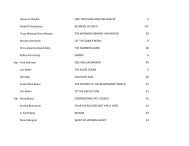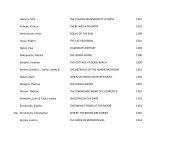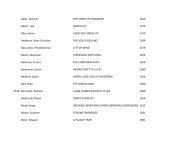nonfiction
nonfiction
nonfiction
You also want an ePaper? Increase the reach of your titles
YUMPU automatically turns print PDFs into web optimized ePapers that Google loves.
“A powerful story of a tumultuous era by an<br />
author more adept at visual art than textual storytelling.”<br />
from darkroom<br />
“marketplace of ideas” and looks to the Enlightenment philosophes<br />
for their views on toleration and defamation.<br />
A spirited defense without being heavy-handed.<br />
DARKROOM<br />
A Memoir in Black and White<br />
Weaver, Lila Quintero<br />
Illus. by Weaver, Lila Quintero<br />
Univ. of Alabama (266 pp.)<br />
$24.95 paperback | Mar. 1, 2012<br />
978-0-8173-5714-6<br />
A debut graphic memoir provides a<br />
unique child’s perspective on racial strife<br />
in 1960s Alabama.<br />
Weaver came to America from Argentina<br />
in 1961 at the age of five and found herself considered an outsider<br />
on both sides of the racial divide. Even within her family,<br />
there were subtle distinctions, with a mother whose European<br />
ancestry made her unmistakably white, a father considerably<br />
darker and an older sister who came much closer to an American<br />
ideal of beauty (though her voluptuous lips were considered<br />
suspect). The memoir is most compelling when it reflects this<br />
child’s perspective, in a town “neatly divided between black and<br />
white. Until we arrived. We introduced a sliver of gray into the<br />
demographic pie.” The illustrations are impressive throughout,<br />
as the author plainly learned much from a father who had<br />
a passion for photography and a mother who was a visual artist.<br />
Yet there are stretches where this narrative of violence and<br />
turbulence could have been written by another, more conventional<br />
observer, where the author disappears from her account<br />
of many incidents that she was too young to witness, let alone<br />
understand. At such points it reads more like a civil-rights<br />
primer (often with powerful imagery) than the account from<br />
an immigrant neither black nor white, “in America but not of<br />
America.” In the afterword, Weaver explains that this began as<br />
an undergraduate project by an adult student, one who is plainly<br />
an accomplished artist but who is still learning how to frame<br />
and sustain a cohesive narrative.<br />
A powerful story of a tumultuous era by an author more<br />
adept at visual art than textual storytelling.<br />
A LIFE WITHOUT LIMITS<br />
A World Champion’s Journey<br />
Wellington, Chrissie<br />
Center Street/Hachette (336 pp.)<br />
$24.99 | May 15, 2012<br />
978-1-4555-0557-9<br />
A world-record–holding professional<br />
triathlete enthusiastically shares a life<br />
devoted to sports, her “drug of choice.”<br />
Early on in her amiable memoir, Wellington<br />
admits to being “accident-prone<br />
and low on common sense.” That fact hardly prevented her<br />
from pursuing a career in the high-octane arena of competitive<br />
sports. Enjoying a happy childhood in eastern England, Wellington<br />
was raised by parents who, while they loved the outdoors,<br />
displayed none of the athletic prowess she’d nurtured<br />
throughout her adolescence, a time plagued with anorexia, bulimia<br />
and alcohol binging. Her burgeoning interest in corporate<br />
law took a backseat to environmental-development work and<br />
concurrent marathon runs, which served to fuel an interest in<br />
triathlon training in Nepal and assorted adventures honing her<br />
craft in Switzerland. She began training with noted Australian<br />
coach Brett Sutton and continued onward to triathlon competitions<br />
worldwide. Wellington traces her personal history<br />
through memories and diary entries. But most compelling are<br />
the urgent details on the meticulous preparatory routines and<br />
rituals necessary to become physically (and mentally) ready to<br />
compete in these grueling contests. Later candid chapters on<br />
her morphing relationship with Sutton, revelations on life and<br />
love and her record-setting racing record effectively gel to illustrate<br />
the strife and struggle as well as the victorious exhilaration<br />
inherent with training, competing in and winning the Kona<br />
Ironman Triathlon. She concludes with comments on the completion<br />
of her 13th Ironman race in 2011.<br />
Empowering and suitably commemorative.<br />
THE SNAKE EATERS<br />
An Unlikely Band<br />
of Brothers and the<br />
Battle for the Soul of Iraq<br />
West, Owen<br />
Free Press (352 pp.)<br />
$26.00 | May 1, 2012<br />
978-1-4516-5593-3<br />
Gripping, disturbing account of<br />
American advisors in Iraq, focused on<br />
several National Guardsmen and the<br />
Iraqi soldiers (jundis) they trained.<br />
Besides being meticulously written, this book has an<br />
unusual pedigree: West, a novelist (Four Days to Veracruz, 2003,<br />
etc.), former Marine and son of renowned military writer Bing<br />
West, was recalled in 2006 to serve a second combat tour in Iraq,<br />
as an advisor in Khalidiya, a city beset by a brutal insurgency.<br />
West’s personal experience makes up the final third of the book,<br />
but the primary section focuses on the National Guard advisor<br />
team that he helped replace. Initially, their war resembled an<br />
unholy combination of Black Hawk Down and Catch-22. Unlike<br />
full-time soldiers, they were abruptly withdrawn from civilian<br />
life, given outdated training in counterinsurgency and sent to<br />
a posting outside the city to pair up with an Iraqi battalion, a<br />
move meant to showcase the Bush administration’s intent<br />
to “stand down” as Iraqi units “stood up.” West vividly captures<br />
the personalities of the advisor team, who quickly found<br />
themselves contending with frequent sniper and bomb attacks,<br />
culminating in the death of a well-liked U.S. corpsman. The<br />
author’s crisp writing makes more apparent the material waste<br />
and absurdity of America’s “small wars.” Despite the advisors’<br />
bravery and good intentions, they were consistently undercut<br />
by supply problems and chain-of-command issues that inevitably<br />
gave the Guardsmen short shrift. West ably captures the<br />
drama in the initially tense relationships between the Americans<br />
and their beleaguered Iraqi counterparts, the remnants of<br />
Iraq’s professional officer class, and he’s sensitive to the nuances<br />
of Iraqi culture, which initially allowed al-Qaeda and other<br />
insurgents to fester in hardscrabble cities like Khalidiya. The<br />
author argues that the unit trained by the Guardsmen evolved<br />
into a determined and nonpartisan fighting force: “For a bunch<br />
of carpenters and cops, they were a pretty determined bunch.”<br />
One of the better reflections on the war in Iraq, with<br />
enough sense of on-the-ground combat reality to hold disturbing<br />
portents for future “small wars.”<br />
EXIT INTERVIEW<br />
Westin, David<br />
Sarah Crichton/Farrar,<br />
Straus and Giroux (288 pp.)<br />
$27.00 | May 22, 2012<br />
978-0-374-15121-8<br />
A former president of ABC News<br />
looks back over the stories that shaped<br />
his leadership.<br />
Westin succeeded Roone Arledge as<br />
the head of the news organization in 1997.<br />
Here he presents an insider’s view of some of the bigger stories<br />
that broke while he was in charge and defends the continuing<br />
value of broadcast news. The major stories included the death<br />
of Princess Diana, the Monica Lewinsky scandal and President<br />
Clinton’s impeachment, the breakdown of exit polling in the<br />
2000 presidential election debacle, 9/11 and the subsequent<br />
invasion of Iraq. The author shows how he established himself<br />
within the company and also the country as the leader of the<br />
most-watched network news broadcast in America. Westin also<br />
notes that while networks favored advertiser-funded broadcasting<br />
that avoided controversy, Fox News and others “embraced<br />
controversy. The more partisan, the better. And this approach<br />
was every bit a matter of shrewd business as it was a matter of<br />
ideology.” The author’s selected stories demonstrate how the<br />
news can be covered without becoming overly polemical, and<br />
he argues against the temptation “to cut back on the reporting<br />
and seek an audience through the expression of opinion.” In<br />
that vein, he looks at Fox’s mixture of “twenty-four hour news<br />
with polemics” and its relation to conservative politics. ABC<br />
News still reaches four times as many viewers as Fox, and Westin<br />
discusses how technology and the Web are being used to<br />
defend that advantage.<br />
Should interest more than just news or politics junkies.<br />
A GOLDEN VOICE<br />
How Faith, Hard<br />
Work, and Humility<br />
Brought Me from the<br />
Streets to Salvation<br />
Williams, Ted with Witter, Bret<br />
Gotham Books (288 pp.)<br />
$26.00 | May 10, 2012<br />
978-1-592-40714-9<br />
A captivating memoir about a man’s<br />
life of drug addiction and homelessness.<br />
With the assistance of veteran co-author Witter (co-author:<br />
Until Tuesday: A Wounded Warrior and the Golden Retriever Who<br />
Saved Him, 2011, etc.), Williams tells the story of how he reached<br />
his childhood dream of becoming a radio voice and subsequently<br />
lost it through his addiction to crack. The author’s obsession<br />
with becoming a radio voice started at age 10 when his mother<br />
bought him a radio. He idolized Hank Spann and learned the<br />
voice-inflection techniques from the on-air personalities of the<br />
time. Williams knew he had the gift of a “golden voice” from<br />
childhood, but he enlisted in the Army after graduation. When<br />
he was dishonorably discharged for black-marketing electronic<br />
equipment, he found a job as a DJ at a radio station in Chadbourn,<br />
N.C. He later became a radio personality and town<br />
celebrity in Columbus, Ohio, until he became addicted to crack<br />
and quit his job to spend all day smoking. The rest of the memoir<br />
follows his life as an addict, homeless person and absentee<br />
father. The grimy details of crack houses and harsh aspects of<br />
homeless life add color to the story, as do the pages written in<br />
the voice of his girlfriend Kathy. The writing style is fast-paced<br />
and easy to follow despite the whirlwind of events, and Williams<br />
does not shy away from self-criticism. Religion becomes<br />
a main theme toward the end of the book, as the author claims<br />
it was God who ultimately led to his freedom and sobriety. The<br />
story ends just before his rise to fame and does not explore his<br />
life after he became a national sensation.<br />
Disturbing and hard to put down.<br />
GREEN ILLUSIONS<br />
The Dirty Secrets of Clean<br />
Energy and the Future<br />
of Environmentalism<br />
Zehner, Ozzie<br />
Univ. of Nebraska (456 pp.)<br />
$29.95 paperback | Jun. 1, 2012<br />
978-0-8032-3775-9<br />
Alternative solutions to the growing<br />
energy crisis other than alternative energy.<br />
“Green” technology and energy solutions<br />
are all the rage as global warming, rising populations and<br />
unheard-of oil prices confront the world. However, asks Zehner,<br />
“do we have a society capable of being powered by alternative<br />
energy” His answer is no. With thorough research, the author<br />
demonstrates that no amount of solar panels, wind turbines,<br />
838 | 15 april 2012 | <strong>nonfiction</strong> | kirkusreviews.com |<br />
| kirkusreviews.com | <strong>nonfiction</strong> | 15 april 2012 | 839






